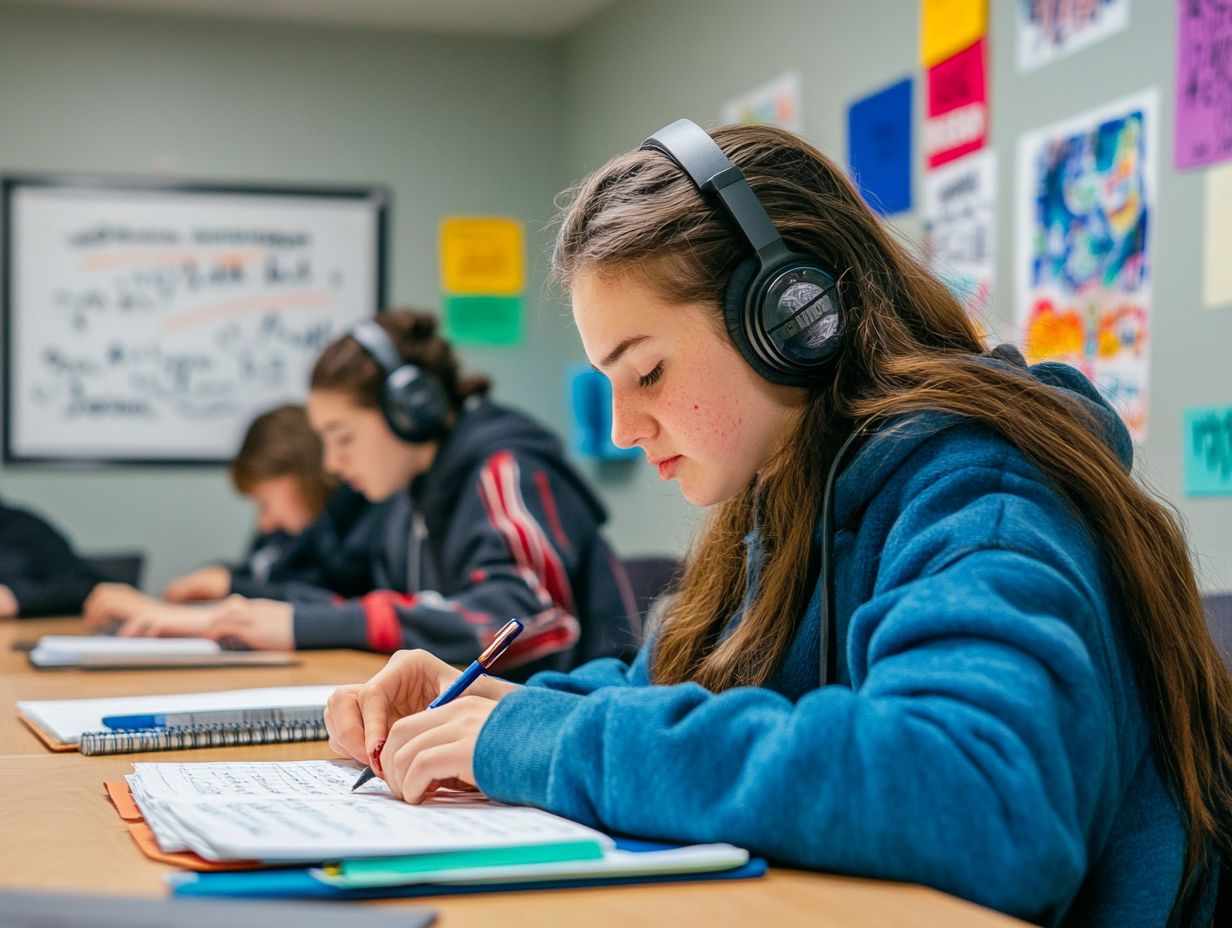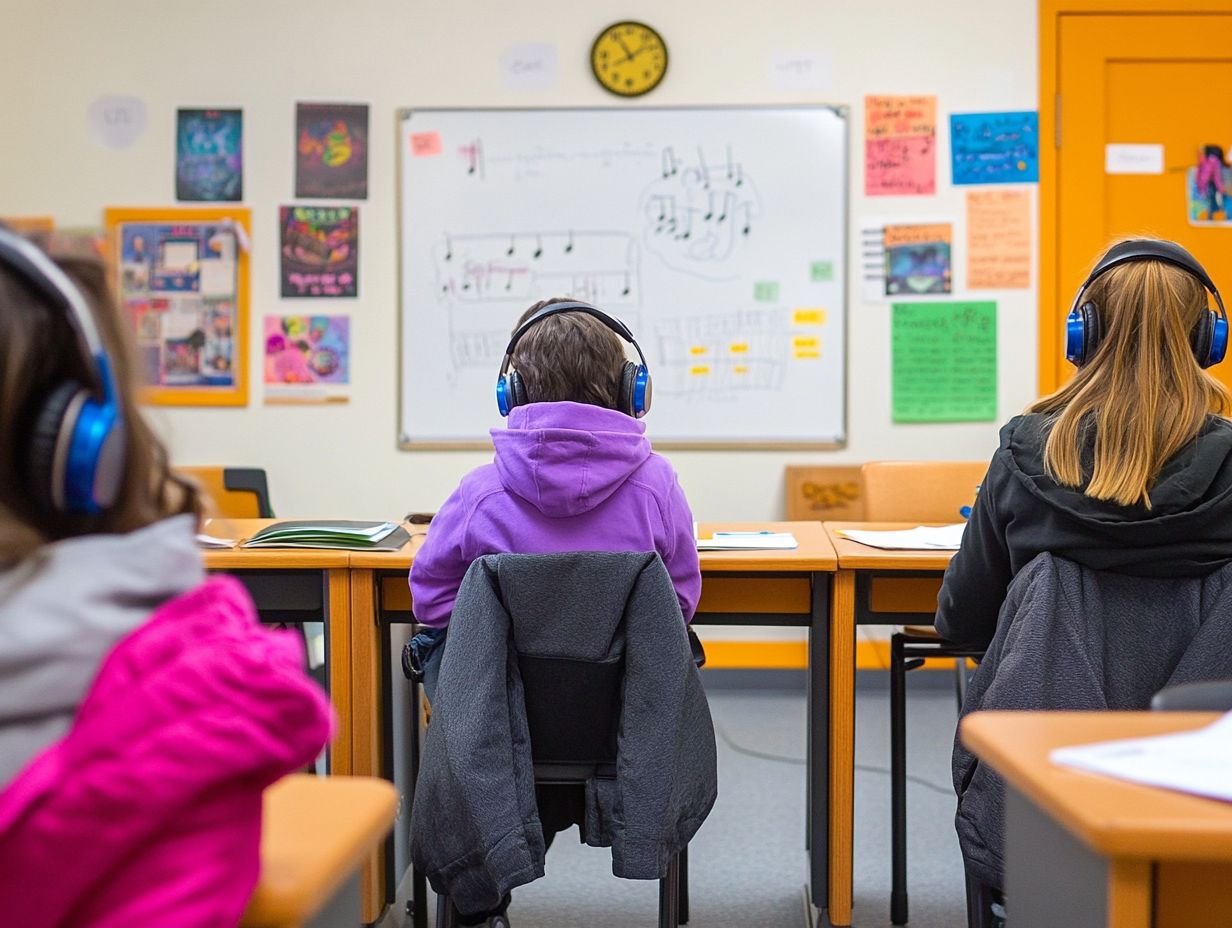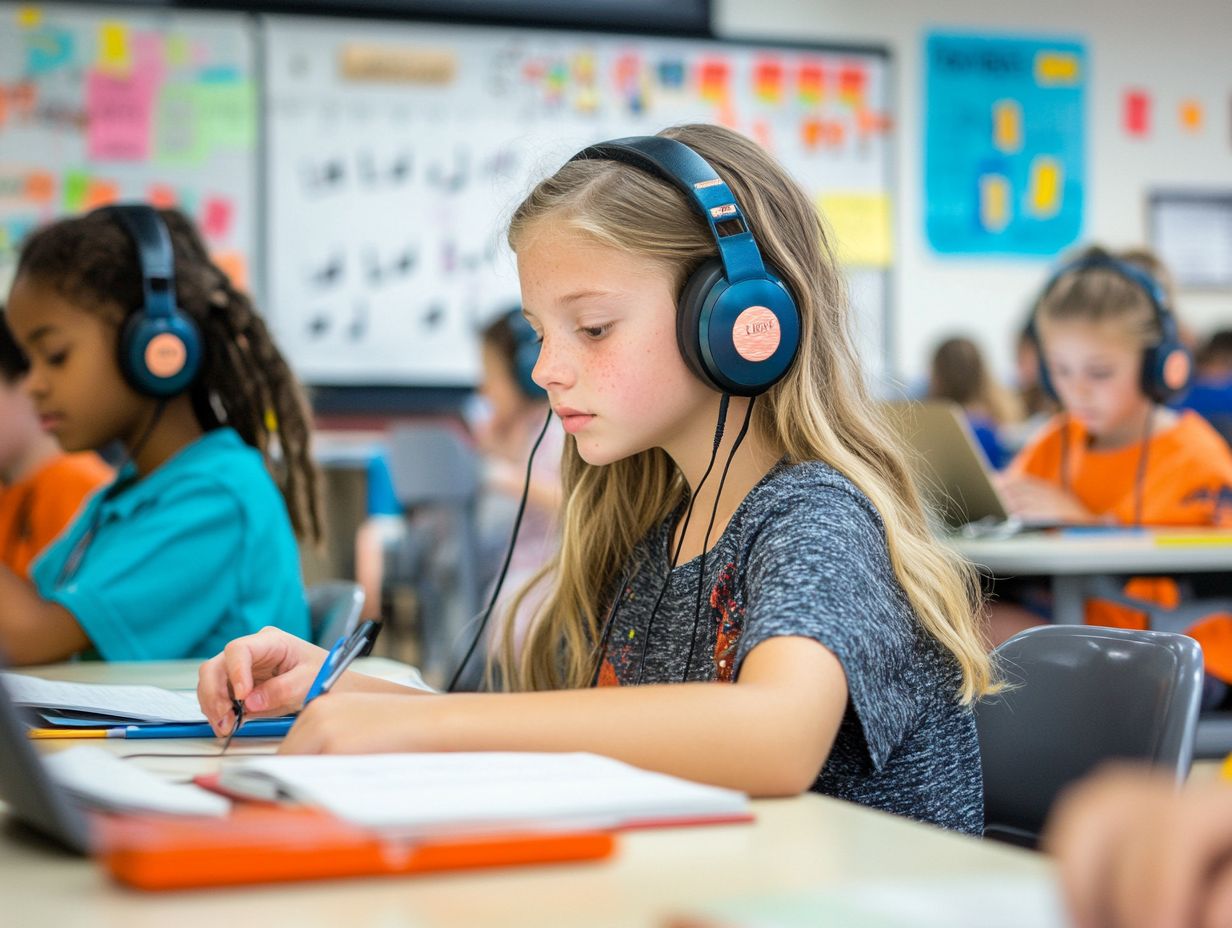how music influences language learning
Music and language are closely connected, sharing rhythms, patterns, and emotional depth that enhance your learning experience.
Incorporating music into your language acquisition can yield remarkable benefits, including improved memory retention, pronunciation, and fluency.
Here, you’ll find practical tips for seamlessly integrating music into your study routine, supported by research findings that highlight its effectiveness.
We will address potential challenges and provide solutions designed to ensure a harmonious learning journey.
Get ready to see how music can supercharge your language skills!
Contents
- Key Takeaways:
- Benefits of Using Music in Language Learning
- How to Incorporate Music into Language Learning
- Research on the Effectiveness of Music in Language Learning
- Potential Challenges and Solutions
- Frequently Asked Questions
- What is the relationship between music and language learning?
- How does music influence language learning?
- Can music help with learning a new language?
- Does the genre of music matter for language learning?
- How can music be incorporated into language learning?
- Are there any drawbacks to using music in language learning?
Key Takeaways:

- Using music in your language learning journey boosts memory and makes learning fun!
- Appropriate songs and activities make language learning more engaging and effective.
- Research shows that music enhances pronunciation and fluency, making it a valuable tool for learners.
The Connection Between Music and Language
The connection between music and language is fascinating, showcasing how rhythm, melody, and how we hear sounds work together to deepen your understanding and communication in a new language.
This synergy enhances your vocabulary retention and helps you master intonation and stress patterns, which are crucial for effective communication.
When you listen to songs, the repetitive nature of the lyrics and enchanting rhythms help cement language concepts in your memory, turning learning into an enjoyable experience.
Listening to music in different languages opens up avenues to grasp cultural nuances and emotional expressions embedded within those languages.
Ultimately, adding musical elements to your learning journey enriches the experience, allowing you to connect more deeply with the language and its communities.
Benefits of Using Music in Language Learning
Utilizing music as a tool in language learning offers numerous benefits, boosting your motivation and emotional engagement while providing cognitive advantages that enhance your learning experience.
Music evokes emotions and creates a memorable context, aiding vocabulary retention, sharpening listening skills, and cultivating cultural awareness. This dynamic approach makes language acquisition more enjoyable and effective, whether you’re a student in a classroom or a dedicated learner on platforms like Busuu.
Enhancing Memory and Retention
Incorporating music into your language learning journey significantly boosts memory and retention. Familiar melodies and lyrics create a rhythm that facilitates repetition and reinforces vocabulary acquisition.
Research indicates that music activates various cognitive functions in your brain, making it easier to remember new words and phrases, especially when connected to the emotions stirred by the music.
This bond between music and emotional resonance strengthens neural pathways, essential for long-term retention. Pairing melodies with vocabulary helps you internalize structures and syntax naturally.
Singing along enhances pronunciation and encourages active participation, transforming learning into an enjoyable experience.
Songs often capture cultural nuances and storytelling, providing valuable context that enriches your learning environment. By exploring different genres and styles, you can navigate diverse linguistic landscapes and broaden your linguistic horizons.
Improving Pronunciation and Fluency

Music is an exceptional tool for enhancing your pronunciation and fluency in language learning. The rhythmic patterns and melodic structures in songs help you master the nuances of sounds and intonations.
Regularly exposing yourself to music in your target language encourages active listening and practice. This ultimately boosts your ability to communicate effectively and confidently.
Embracing various genres and dialects allows you to immerse yourself in diverse cultural influences, enriching your linguistic repertoire. The captivating melodies motivate you to engage more deeply, encouraging repetition and mimicry that fine-tunes your phonetic accuracy.
The interplay between rhythm and speech reinforces your vocabulary and enhances your comprehension skills. Singing along helps you internalize pronunciation models, making music not just an enjoyable pathway to fluency, but a key player in mastering the intricacies of a new language.
How to Incorporate Music into Language Learning
Incorporating music into your language learning journey can be effective and enjoyable.
It allows you to immerse yourself fully in the new language while engaging with various songs and activities tailored to enhance your skills. Selecting music that resonates with you cultivates an environment ripe for practice and exploration, leading to improved comprehension and communication.
Choosing Appropriate Songs and Activities
Selecting the right songs and activities is essential for maximizing the benefits of music in your language learning journey. This ensures you stay engaged and connected to the cultural insights in the lyrics.
When educators curate a diverse selection of songs, they foster emotional engagement and provide you with valuable contextual vocabulary and pronunciation practice.
Incorporating various genres and styles allows educators to cater to your unique tastes, making the learning experience enjoyable and effective. It s crucial to choose songs that reflect the target language and illustrate the cultural nuances associated with it.
Activities like lyric analysis, sing-alongs, or creative writing inspired by the themes of the songs can deepen your understanding. Lyric analysis involves examining the meaning and structure of the song lyrics, enhancing your emotional connection to the language.
This approach nurtures a holistic language learning environment, enriching both your comprehension and communication skills.
Research on the Effectiveness of Music in Language Learning
Numerous studies highlight the profound impact of music on language learning, illustrating how to use music for language practice to enhance cognitive benefits and enrich your overall language acquisition experience.
Integrating music into your learning environment cultivates emotional engagement, boosts motivation, and offers unique opportunities for practice and immersion.
Embrace the rhythm of learning and see how it transforms your language skills!
Studies and Findings

A variety of studies have explored the impact of music on language learning, consistently showcasing its cognitive benefits and effectiveness in enhancing your language skills and overall engagement. When you listen to music in your target language, you can expect improved pronunciation, vocabulary acquisition, and a deeper emotional connection to the language.
Research from prestigious institutions like the University of Edinburgh shows that rhythm and melody enhance memory retention, making it easier to recall vocabulary and grammatical structures.
Studies also suggest that incorporating song lyrics into your lessons aids in auditory processing and fosters deeper emotional engagement, allowing you to form personal connections with your studies.
This approach creates a more immersive learning environment where you feel motivated to practice your speaking and listening skills, ultimately leading to greater fluency. By integrating music into your language learning journey, you unlock enjoyment and effectiveness that can truly transform your experience.
Potential Challenges and Solutions
Incorporating music into language learning offers many benefits. However, you may face some challenges.
Language barriers and cultural differences can hinder communication. By understanding these challenges, you can develop strategies that help learners enjoy the enriching experience that music provides.
Overcoming Language Barriers and Cultural Differences
Overcoming these barriers is crucial to maximize the benefits of music in learning. These factors can greatly affect how well students communicate and engage.
Focus on building understanding and appreciation for different cultures. This creates a more inclusive and effective learning environment.
Incorporate various musical genres from different cultures. This way, you explore not only the language but also the stories and emotions tied to that music.
Engage in activities like songwriting, rap battles, or group performances. These collaborations enhance language skills and spark meaningful conversations.
Such immersive experiences break down barriers and promote empathy among students. They help build a stronger sense of community in your classroom.
Frequently Asked Questions
What is the relationship between music and language learning?

Music greatly enhances language learning by engaging and stimulating the brain. By using music to enhance language immersion, both music and language can be processed in similar areas, making them closely linked.
How does music influence language learning?
Music influences language learning in several ways. It improves memory, enhances pronunciation, and makes practicing more fun and creative, especially when you consider using music to improve language skills.
Can music help with learning a new language?
Absolutely! Listening to music in a foreign language boosts listening and comprehension skills. It also introduces new vocabulary and grammar, making learning enjoyable and effective.
Does the genre of music matter for language learning?
The genre can influence language learning, evoking various emotions and moods. However, the key is to choose music that learners enjoy to enhance their experience.
How can music be incorporated into language learning?
Incorporate music by listening to songs in the target language or writing and performing your own. Music also serves as a fun tool to remember vocabulary and grammar rules.
Are there any drawbacks to using music in language learning?
While music can greatly enhance learning, it may not suit every learner. Some might find it distracting, so it’s important to experiment to find what works best for each individual.





